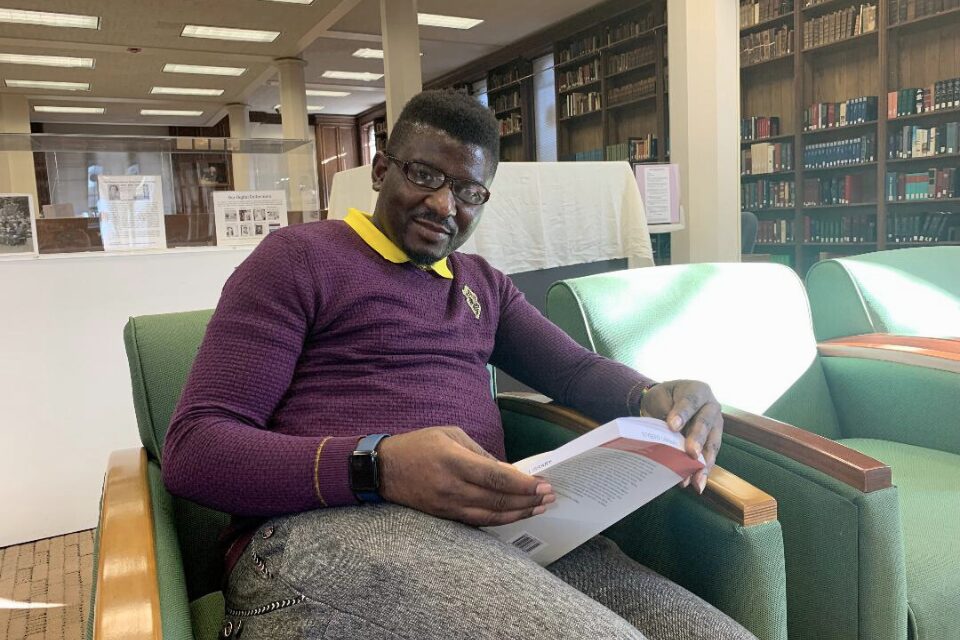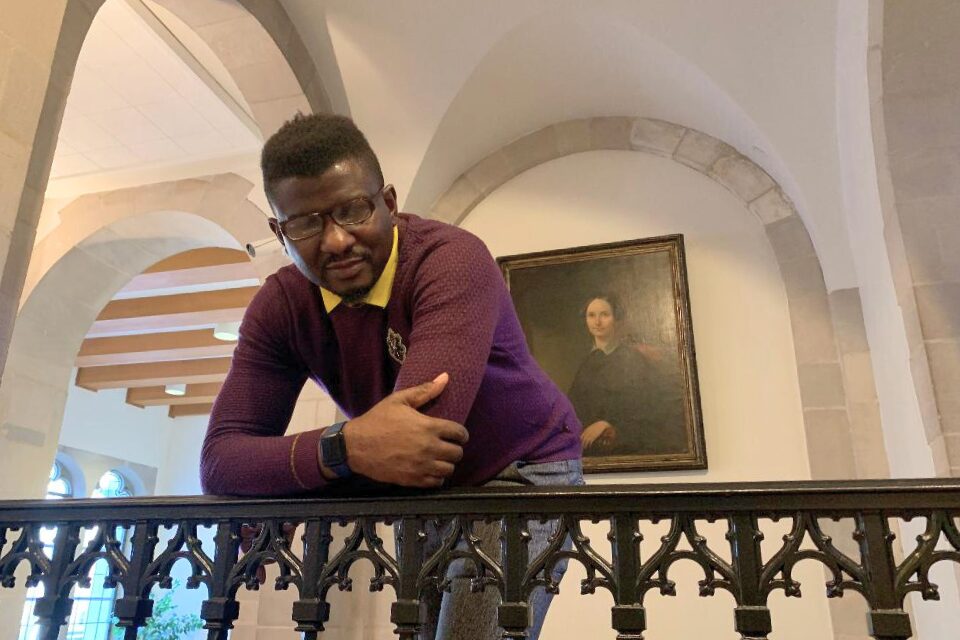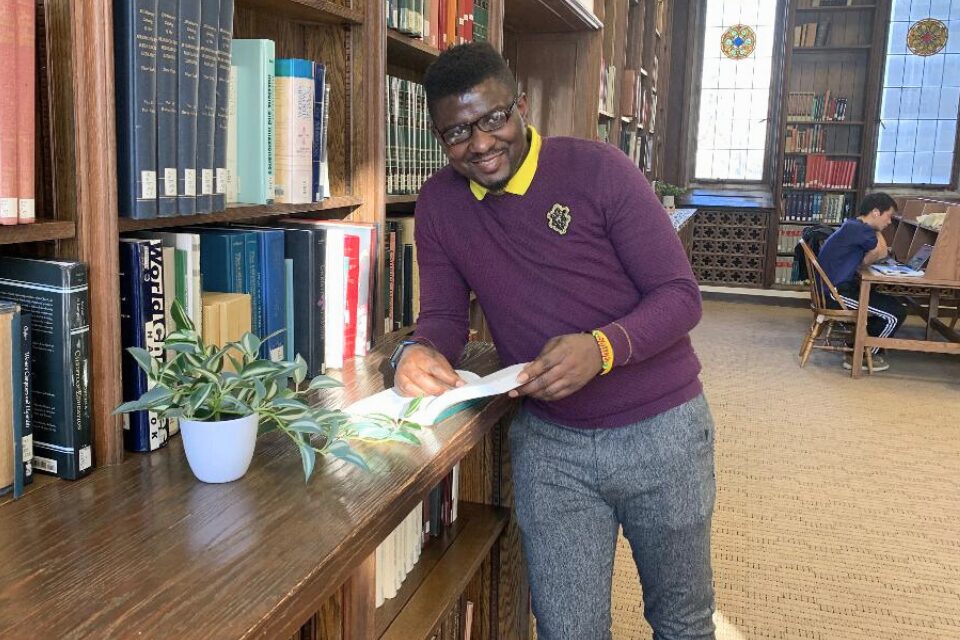Retired pastor Glenn Wagner tells the story of a refugee’s courageous life that attests to the connectional spirit that is central to Methodism.
GLENN M. WAGNER
Michigan Conference Communications
Desire Niyonkuru’s life is a testament to the power of prayer. His life is also a positive witness to God’s working through the Holy Spirit and The United Methodist Church to share the love of Christ in a life-transforming way across the world.
Niyonkuru knows unspeakable hardship firsthand and what it means to rely on God’s providence for his daily bread.
Desire Niyonkuru is a 35-year-old native of the African nation of Burundi. He is currently studying for his master’s degree in pastoral counseling at Garrett-Evangelical Theological Seminary in Evanston, IL. He has traveled 7,769 miles across several continents, a great ocean, and seven time zones from the place of his birth for this educational opportunity.
He is fluent in five languages: Kurundi, Shona, Swahili, French, and English. He is creative, determined, and resilient. His inspirational faith journey testifies to the power of prayer, God’s grace in horrific circumstances, and gratitude for the many United Methodist gifts that have helped to sustain his life and support his education.
Desire Niyonkuru was born in 1986 as the second son of a family of Hutu farmers in Burundi, a landlocked nation in the Great Rift Valley where the African Great Lakes region and East Africa meet. Burundi has suffered tribal violence on multiple occasions throughout Desire’s life. In July 2023, the British Broadcasting Corporation (BBC) reported that “Burundi, one of the world’s poorest nations, is struggling to emerge from a 12-year, ethnic-based civil war.”
Violent clashes in Burundi between the Hutu majority and the Tutsi ruling classes have resulted in mass displacements and casualties. In 1995, when Desire was just nine, his family fled their homeland because of the violence. They traveled five hundred miles to neighboring Tanzania, where they lived on subsistence handouts in a refugee camp that offered temporary shelter from the violence but very little in the way of hope and education for him and his older brother.
In 2008, the Niyonkuru family returned to Burundi. When his parents attempted to reclaim their family land, they were murdered. Desire was warned to leave if he didn’t want to be killed like his parents. His older brother settled in South Africa.
Having already experienced the poor living conditions at the Tanzania refugee camp, Desire chose instead to go to a different refugee camp in Zimbabwe, some 1,500 miles south of Burundi. There, he learned that opportunities for education and a life beyond the daily dependence in the refugee camps were as limited in Zimbabwe as in Tanzania.
While living in the Zimbabwe refugee camp, Desire also learned about possible educational opportunities beyond high school at Africa University, located 120 miles north of the camp. A world-class university known for leadership development throughout Africa, Africa University was founded by United Methodists near Mutare, Zimbabwe, in 1992. Michigan United Methodists have been strong supporters of the work at Africa University (click this link to preview a list of articles about this important relationship). Africa University is also a Step 4 Ministry Partner of EngageMI, the mission program of the Michigan Conference.

Upon hearing of this university, Desire hoped. He prayed. He planned. He scraped savings to afford the $25 application fee and additional transportation costs to visit the Africa University campus so he could plead his hopes for higher education in person. He remembered that such applications for higher education in Burundi were routinely denied to Hutu students by the Tutsi ruling class. When he arrived at Africa University to submit his application in person, Desire made multiple appeals around campus while visiting officials in charge of admissions. On this first visit, he was told that the university lacked the resources to fund the education of students who could not afford to pay their way.
Desire returned to the refugee camp and continued to pray. Six months after applying to Africa University, he received the joyful word that his application had been accepted. In faith and without knowing how he would ever afford it, he moved to campus to begin his studies. Desire remembers the struggle to survive on campus with no money and no other family to support his efforts. For a while, he lived with four students in a small room and slept on the floor. He was able to eat once a day and lived on prayer and an unshakeable trust that God would continue to open doors for him.
Prayers were answered. He learned that Africa University had become aware of the plight of refugees in Zimbabwe. Partly because of his presence on campus, the university developed a program allowing five students from the camp each year to be supported in their studies at Africa University. As one of those students, Desire earned his bachelor’s degree in health science from the United Methodist-related Africa University, graduating in 2016.
After graduation, Desire returned to live in the refugee camp, where he faced the reality that despite his new degree, he was still a poor refugee without a country, family, or opportunities for employment.
In 2018, he returned to Africa University to pursue a master’s degree. He found temporary housing in the home of one of the university’s professors. However, he worried about one major obstacle to completing his degree. The university had informed all students that they could not take their final exams and graduate until their tuition bills were paid in full.
Desire sang in the Africa University Choir, and he recalls the visit of some United Methodists who came on a mission trip from the United States. After a choir concert, he was surprised to receive an invitation from one of the Americans to meet on campus. They invited Desire to tell his story. He remembers with profound gratitude that a short while after the Americans’ visit, he was told he would be allowed to take his exams and that his tuition had been covered.
Desire finished his master’s degree at Africa University in 2020 and dreamed of continuing his education in America. He was hopeful there would be expanded opportunities for him to continue learning at a United Methodist graduate school in the United States. However, the COVID-19 pandemic seemingly dashed those hopes and restricted foreign travel and visas.

But in 2021, Desire was accepted into the master’s degree in pastoral care and counseling program at Garrett-Evangelical Theological Seminary (G-ETS). He was pleased when his prayers were answered; he was granted a visa to study in the United States.
Desire’s tuition and living expenses at G-ETS are covered by scholarships, grants, and participation in the seminary’s work-study program.
A scholarship established in 2006 in recognition of the ministry of a Michigan United Methodist pastor covers part of Desire’s tuition costs this year. This scholarship is one of more than 500 named scholarship funds that are part of the G-ETS endowment. The endowment fund assisting Desire has been supporting candidates for ministry annually since its inception. According to Joe Emmick, vice president for development at G-ETS, $3 million annually is given to all full- and part-time students to cover at least half of their tuition expenses.
Sarah Pressley, director of stewardship and special projects at G-ETS, notes that the seminary currently has an enrollment of 300 students. One hundred eighty of these students are seeking master’s degrees, while others are enrolled in doctoral programs. The seminary also provides education and ministry training for persons who are seeking certification as licensed local pastors.
Many Michigan United Methodist pastors, deacons, and lay leaders have received education and training at G-ETS. A few retired bishops with Michigan connections are members of the seminary’s board of trustees: Laurie Haller, Don Ott, and Sharon Rader. Michigan Conference Chancellor Andrew Vorbrich is also a member of the board.
Thanks to the generosity of many United Methodists he has never met, Desire Niyonkuru, a refugee from one of the world’s poorest nations who lost his parents and land to violence, is on track to graduate with his degree from G-ETS in the spring of 2024. He hopes to pursue his PhD as the next step in his journey of a life devoted to helping others and following the example of Christ.
Last Updated on February 6, 2024

